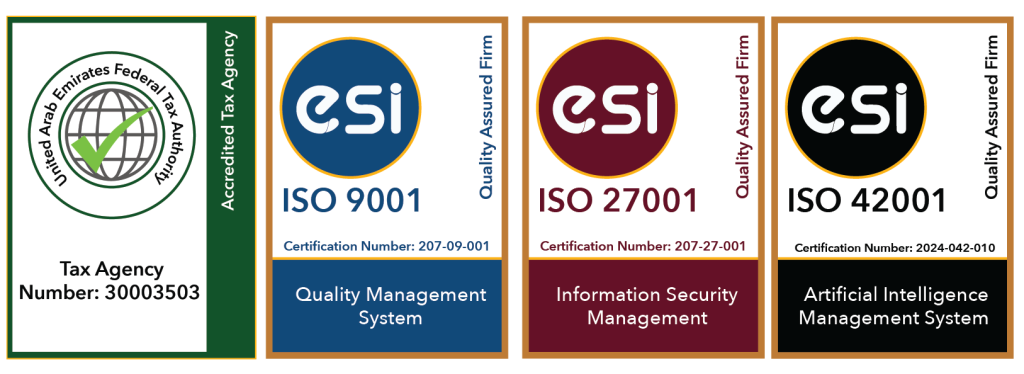For many UAE businesses, the UAE’s corporate tax regime, introduced under Federal Decree-Law No. 47 of 2022, has introduced significant compliance responsibilities for businesses. The Corporate Tax legislation is a significantly more complex Tax framework and familiarity can take time. An unoptimized tax liability and unidentified compliance risk may be present, especially for enterprises that have not taken formal advice.
Once the your first tax return is submitted or annual financial accounts are closed, it is the ideal time to review the company’s tax model.
This article outlines how UAE businesses can benefit from a Corporate Tax Annual Health Check to maintain compliance, identify risks, and highlights opportunities to optimize tax liabilities before the next filing cycle.
Why a Corporate Tax Health Check Matters
Corporate tax compliance goes beyond meeting deadlines. It requires accurate reporting, proper documentation, and strategic planning. A health check delivers three key benefits:
- Compliance Assurance: Confirms that registration, classification, and reporting meet Federal Tax Authority (FTA) requirements.
- Risk Reduction: Detects errors in opening balances, deductions, or unqualified exemptions before they lead to penalties or audits.
- Tax Optimization: Identifies opportunities for reliefs, exemptions, and group structuring to minimize liabilities.
Our Best Practice Approach Under Corporate Tax Health Check
1. Confirm Registration and Classification
Verify your entity is registered with the FTA and correctly classified as a Resident Person or Non-Resident Person. Free Zone entities must confirm eligibility for Qualifying Free Zone Person (QFZP) status to benefit from the 0% tax rate on qualifying income.
2. Validate Opening Balance Sheet and Transitional Provisions
The accuracy of the opening balance sheet is critical for the first tax return and future filings. The review of asset values, liabilities, and transitional adjustments are necessary to ensure compliance with tax rules.
3. Review Tax Adjustments and Deductions
Taxable income often differs from accounting profit. Key areas under review include:
- Non-Deductible Expenses: Exclude fines, penalties, and certain donations.
- Interest Limitation Rules: Apply the 30% EBITDA cap on net interest expenses.
- Unrealized Gains and Losses: Ensure correct treatment under the law.
- Review and benchmark connected party remuneration- salary and compensation paid to directors are a risk and are subject to Transfer Pricing rules
4. Assess Transfer Pricing Compliance
Businesses with related-party transactions must comply with arm’s length principles. Maintaining a Transfer Pricing documentation which can be requested under audit as required by the FTA to avoid penalties.
5. Optimize Group Structures and Reliefs
- Tax Grouping: Companies with 95% or more ownership in subsidiaries can form a tax group to consolidate profits and losses. A Tax Group may or may not be beneficial and should be assessed.
- Small Business Relief: Businesses with revenue up to AED 3 million may qualify for simplified compliance and a 0% tax rate.
- Free Zone Benefits: Review eligibility for 0% tax on qualifying income and ensure compliance with substance requirements. This is subject to a detailed assessment to assure the rules are met to and your business can provide the necessary evidence to qualify.
6. Strengthen Documentation and Record-Keeping
Businesses must maintain accurate financial records for at least seven years. Supporting documents for deductions, exemptions, and adjustments should be readily available for FTA audits.
What to Do If You Missed the Deadline
Companies that did not file on time are now non-compliant. The FTA imposes penalties for late filing and late payment:
- Late Filing Penalty: AED 500 per month for the first 12 months, increasing to AED 1,000 per month thereafter.
- Late Payment Interest: 14% annual interest on unpaid tax, calculated monthly.
- Other Risks: Reputational impact, operational delays, and increased audit scrutiny.
Immediate Steps:
- File Without Delay: Submit the return through the EmaraTax portal, even if incomplete.
- Pay Outstanding Tax: Settle any liabilities to stop interest from accruing.
- Seek Professional Support: A tax advisor can help calculate penalties, correct errors, and restore compliance quickly.
The longer the delay, the higher the penalties and risks. Acting promptly is essential.
Preparing for Future Filing Cycles
The nine-month rule applies to all future tax periods. For example, if the next financial year ends on December 31, 2025, the filing deadline will be September 30, 2026. Businesses with different year-ends should calculate their deadlines accordingly.
Early preparation ensures timely compliance and avoids last-minute errors. Key actions include:
- Schedule Internal Reviews: Conduct quarterly checks to track compliance.
- Update Accounting Systems: Align financial reporting with tax requirements including changes in chart of accounts.
- Plan for Reliefs: Evaluate eligibility for small business relief, tax grouping, and Free Zone benefits well in advance.
Benefits of a Proactive Approach
- Avoid Financial Penalties: Stay ahead of FTA audits and compliance checks.
- Improve Cash Flow: Optimize deductions and leverage available reliefs.
- Enhance Governance: Build confidence with stakeholders and regulators.
- Strategic Advantage: Use tax planning as a tool for growth and sustainability.
Conclusion
A Corporate Tax Annual Health Check is a valuable approach to support your businesses financial stability and growth. Whether a business met the previous deadline or not, now is the time to review its tax position, correct any gaps, and prepare for the next cycle. Proactive compliance reduces risks, avoids penalties, and positions businesses for long-term success.
About SimplySolved
As an FTA-approved Tax Agency and ISO 9001, 27001, and 42001 certified firm, SimplySolved delivers comprehensive corporate tax and compliance solutions tailored to business requirements. Supported by experienced consultants, we provide expert assistance in Corporate Tax Registration and reporting, annual tax health checks, and cross-border impacts to ensure full compliance with UAE regulations and international standards.
We serve 100s of clients, helping them maintain compliance across all corporate tax obligations and optimize their tax positions. Our approach combines practical expertise with structured processes, enabling businesses to focus on core operations while receiving reliable, cost-effective support from a trusted partner.





